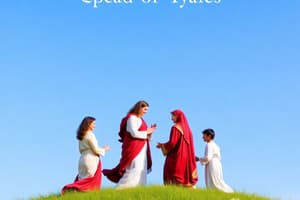Podcast
Questions and Answers
Which of the following is NOT one of the core principles taught in the Bible?
Which of the following is NOT one of the core principles taught in the Bible?
- Sacrifice yourself (correct)
- Salvation through Jesus Christ
- Love God
- Love your neighbor
Abraham is known as the father of the Israelite nation.
Abraham is known as the father of the Israelite nation.
True (A)
What significant event did Jacob undergo that led to his new name, Israel?
What significant event did Jacob undergo that led to his new name, Israel?
He wrestled with God.
The Ten Commandments were given in the book of ______.
The Ten Commandments were given in the book of ______.
Match the patriarch with their key characteristic:
Match the patriarch with their key characteristic:
Which prophet is known as the 'weeping prophet'?
Which prophet is known as the 'weeping prophet'?
The Great Commission is found in the Old Testament.
The Great Commission is found in the Old Testament.
What major theme is emphasized in the prophecies of Isaiah?
What major theme is emphasized in the prophecies of Isaiah?
Flashcards are hidden until you start studying
Study Notes
Biblical Teachings
-
Core Principles:
- Love God and love your neighbor (Matthew 22:37-39).
- The importance of faith, grace, and forgiveness.
- Salvation through Jesus Christ (John 14:6).
-
Old Testament Teachings:
- Creation story (Genesis 1-2).
- The Ten Commandments (Exodus 20).
- The covenant between God and Israel.
-
New Testament Teachings:
- The Sermon on the Mount (Matthew 5-7).
- Parables teaching moral lessons (e.g., The Good Samaritan).
- The Great Commission (Matthew 28:19-20).
Patriarchs of the Israelite Nation
-
Abraham:
- Considered the father of the Israelite nation.
- Made a covenant with God, promising descendants and land (Genesis 12, 15).
-
Isaac:
- Son of Abraham and Sarah.
- Continued the covenant and married Rebekah (Genesis 24).
-
Jacob:
- Son of Isaac, later named Israel.
- Had twelve sons, who became the leaders of the twelve tribes of Israel (Genesis 32:28).
-
Joseph:
- Favored son of Jacob, sold into slavery by his brothers.
- Rose to power in Egypt, saving his family from famine (Genesis 37, 39-45).
Major Prophets
-
Isaiah:
- Prophesied about the coming Messiah and the future restoration of Israel.
- Emphasized themes of judgment and comfort (Isaiah 1-66).
-
Jeremiah:
- Known as the "weeping prophet."
- Warned of Jerusalem's destruction and the need for repentance (Jeremiah 1-52).
-
Ezekiel:
- Prophesied during the Babylonian exile.
- Known for visions and symbolic acts, including the Valley of Dry Bones (Ezekiel 37).
-
Daniel:
- Served in the Babylonian and Persian courts.
- Known for his dreams and visions, including the prophecy of the four beasts (Daniel 7).
-
Minor Prophets (e.g., Hosea, Amos, Micah):
- Addressed issues like social justice, idolatry, and the need for repentance.
- Each had unique messages relevant to their time.
Biblical Teachings
- Core belief centers on loving God and one's neighbor, as highlighted in Matthew 22:37-39.
- Key elements include faith, grace, and the principle of forgiveness.
- Salvation is through Jesus Christ, emphasized in John 14:6.
Old Testament Teachings
- The Creation story is detailed in Genesis chapters 1-2, outlining the origins of the world.
- The Ten Commandments, found in Exodus 20, serve as foundational ethical guidelines.
- A crucial covenant exists between God and Israel, marking a unique relationship.
New Testament Teachings
- The Sermon on the Mount (Matthew 5-7) presents teachings on ethics and spirituality.
- Parables, such as The Good Samaritan, offer moral lessons relevant to daily life.
- The Great Commission (Matthew 28:19-20) instructs believers to spread the gospel.
Patriarchs of the Israelite Nation
- Abraham is regarded as the father of the Israelite nation, establishing a covenant with God for descendants and land in Genesis 12 and 15.
- Isaac, the son of Abraham and Sarah, continues the covenant and marries Rebekah as described in Genesis 24.
- Jacob, also called Israel, is the son of Isaac and father to twelve sons, who become the leaders of the twelve tribes (Genesis 32:28).
- Joseph, the favored son of Jacob, faces betrayal and slavery but rises to power in Egypt, ultimately saving his family from famine (Genesis 37, 39-45).
Major Prophets
- Isaiah foretells the coming Messiah and restoration of Israel, addressing themes of judgment and comfort throughout his writings (Isaiah 1-66).
- Jeremiah, known as the "weeping prophet," warns of impending destruction in Jerusalem and calls for repentance (Jeremiah 1-52).
- Ezekiel prophesies during the Babylonian exile, known for symbolic visions, including the Valley of Dry Bones (Ezekiel 37).
- Daniel serves in royal courts during the Babylonian and Persian empires, recognized for his prophetic dreams and visions, notably the prophecy of the four beasts (Daniel 7).
- Minor prophets like Hosea, Amos, and Micah tackle themes of social justice, idolatry, and repentance, delivering messages pertinent to their historical contexts.
Studying That Suits You
Use AI to generate personalized quizzes and flashcards to suit your learning preferences.




